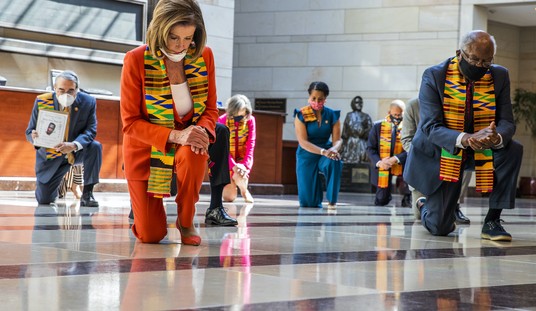An election-year bombshell, just across the wires. Rove, you magnificent bastard. Stand by for updates.
Update: Here’s the opinion. How does 172 pages sound?
Update: The AP story is thin on specifics since it’ll take awhile to digest the holding. Read this useful bullet-point background from the Journal to get up to speed on the legal posture. Note that six of the seven justices on the court are Republicans. Will the ruling stick?
“Pro-family” organizations have submitted more than 1.1 million signatures for an initiative that would amend the state Constitution to outlaw same-sex marriage. If at least 694,354 signatures are found to be valid, the measure would go on the November ballot and, if approved by voters, would override any court ruling in favor of same-sex marriage.
Proposition 22, the California ballot initiative that defined marriage in the state as between one man and one woman (even if the marriage was entered into in another state that allows same-sex marriage), passed in 2000 by a margin of 1.7 million votes.
Update: Sounds like a major win:
Gays and lesbians have a constitutional right to marry in California, the state Supreme Court said today in a historic ruling that could be repudiated by the voters in November.
In a 4-3 decision, the justices said the state’s ban on same-sex marriage violates the “fundamental constitutional right to form a family relationship.” The ruling is likely to flood county courthouses with applications from couples newly eligible to marry when the decision takes effect in 30 days.
The ruling set off a celebration at San Francisco City Hall.
Update: A quick skim reveals that the opinion’s fairly straightforward. They start out by noting that California’s different from other states that have dealt with this insofar as it already has a robust domestic partnership law. All this is about, really, is whether gays should be allowed to “marry” the way straights do or whether they’re stuck with those partnership agreements that leave them married in effect but not in name. Conservatives like partnership schemes and/or civil unions as an alternative to gay marriage, but I’ve always thought that argument’s self-defeating since it leaves you with no substantive reason for drawing any distinction in the first place. Yes, (some) conservatives seem to be saying, gays can go ahead and have civil unions that grant them all the benefits married couples have — but for god’s sake, don’t let them call themselves “married.” To which a court can only reply, “Why not?” The right’s strategy, in other words, has been to concede 99 yards and then stand on the one-yard line and say “no further,” but that’s not how discrimination jurisprudence works. If you’re going to discriminate you need a good reason, and depending upon whom you’re discriminating against, you may need a very, very good reason.
That’s actually the key ruling here: The court holds on page 95 that because sexual orientation is (1) immutable, (2) unrelated to one’s ability to function in society, and (3) a target of prejudice, it should be treated as a “suspect classification” for purposes of the state constitution’s equal protection clause. Once it’s deemed a suspect classification then the state needs a very compelling reason to justify discriminating on the basis of it — and since, as I say, it’s already conceded those 99 yards, there’s no such reason to be had. (If you want to bore yourself with the vagaries of equal protection jurisprudence, read this old post about New Jersey’s gay marriage ruling.) All they’re doing is denying gays the label of marriage to preserve a sense of stigma, which is almost a paradigm case of what equal protection is meant to prevent. I have no problem with the ruling as long as other states aren’t compelled to recognize Cali marriages per full faith and credit, which, needless to say, is the battleground on which this decision’s going to be fought in the presidential race. Taking the federalist approach and letting each state decide for itself is an easy call for Maverick; what about the Prince of Peace?
Exit question: Remember this golden oldie from the 2006 midterms?








Join the conversation as a VIP Member